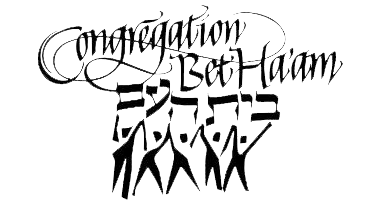by Jane Sloven, congregant
The Kabbalists teach that everything we do stirs up a corresponding energy in other realms of reality. When we remain cognizant of this mystical system, we are careful about what we do, say, or even think, for we know that everything is interdependent; we know that a seemingly insignificant gesture could have weighty consequences.
~God is a Verb, Rabbi David A. Cooper (p. 132)
Selichot is the worship service that helps us to prepare to enter the high holidays mindfully. It is also the word for prayers for forgiveness. We are most familiar with the Selichot prayers from our Rosh Hashanah and Yom Kippur services. We recite them as we seek forgiveness for ourselves and our community, hoping to be inscribed in the Book of Life for another year.
These prayers are part of teshuva, our process of returning to ourselves—re-centering, reorganizing, recommitting—or simply reaching out to collect the parts of ourselves that have floated off during the year. At this time in the cycle of our holidays, we focus on returning to right relationship with ourselves and doing the work of returning to right relationship with others and with The Holy One of Blessing.
This process formally begins in the month of Elul and ends when the gates close at the completion of Yom Kippur. Our tradition instructs us to engage in a thoughtful review of our lives at this time of the year, to evaluate how we have lived in the past year, to examine how we have missed the mark, and to resolve to do better so that we can enter the new year committed to a life that more closely comports with our values.
One’s actions, particularly deeds of lovingkindness, profoundly impact upon the universe. Minor actions can have significant consequences …everything happening to us is connected with a complex weave of variables. Moreover, angelic forces are associated with our thoughts, words and deeds.
~God is a Verb; Rabbi David A. Cooper (p. 28)
Our tradition offers us this annual opportunity to engage in self-reflection, to soften around the hurts we have suffered, to release resentments, grudges, and self-righteousness. Through this preparation we become ready to offer heartfelt apologies to those we have hurt and to honestly accept the apologies we are offered. Compassion and lovingkindness for ourselves and others are crucial qualities in this endeavor, and they can become more accessible to us through the rituals of Elul, Rosh Hashanah, and Yom Kippur.
The Jewish mystical point of view is that creation is based upon compassion and lovingkindness.
~God is a Verb; Rabbi David A. Cooper (p. 244)
Our Selichot service offers the opportunity to mindfully engage in this process of teshuva with our community. This worship service is co-led by Jane Sloven, Sharon Newman, Daniel Oppenheim, and Joseph Py.
This is what you can anticipate experiencing during our Selichot service:
~Carefully selected and meaningful prayers, psalms, melodies, and poems.
~Readings and drashes (interpretations) that illuminate the origins of the prayers we recite during these holidays.
~Clarification of the connections between our history and our worship on Rosh Hashanah and Yom Kippur.
~Insight into a template set by our mystical tradition’s creation story—one of error and shatterings, followed by rectification and repair.
~The opportunity to truly hear the voice of the shofar.
~Guided meditations carefully crafted to assist you in reviewing the ways you may have missed the mark in the past year, and helping you to prepare to both ask for forgiveness and to offer it.
…Deep spiritual work can open the gates of heaven.
God is a Verb; Rabbi David A. Cooper (p. 28)
Our Selichot service offers spiritual preparation for the High Holidays. Please join us. Register here and on September 12 at 5:00 p.m., we will send you the link to our prerecorded service.
Photo by Levi Jones on Unsplash

